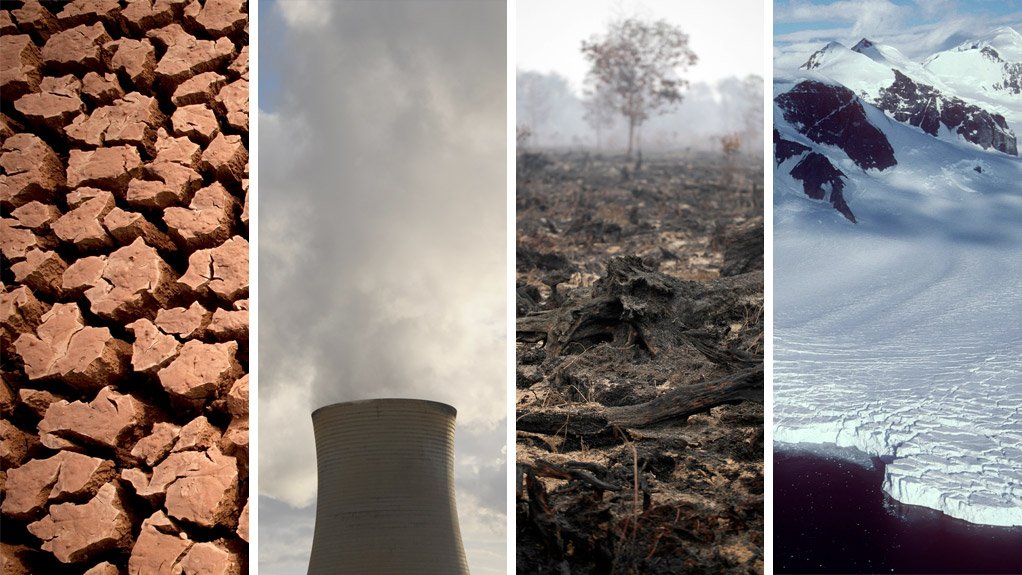We must adapt to permanently 1.5 ºC warmer climate, scientist says
Global warming has not only surpassed 1.5 ºC above preindustrial levels but is also set to remain at or above that level permanently, University of the Witwatersrand Professor Francois Engelbrecht said on February 26.
Speaking to a global gathering of scientists at the Science 20 (S20) forum in Pretoria, he explained that the climate is likely to reach a 1.5 ºC or higher state by the late 2020s or early 2030s.
“We can probably no longer avoid 1.5 ºC of global warming, and we will not return below that level unless we develop new technology capable of removing carbon dioxide from the atmosphere.
“So, we have to adapt. That is the first message coming from climate models. We are committed to further warming; this dangerous world is dawning. We have to adapt to the impacts of climate change in that warmer world,” he said.
Engelbrecht emphasised that the era of 1.5 ºC of global warming is upon the world. He noted that 2023 was the first full calendar year to exceed this threshold, with an alarming 12-month period between July 2023 and June 2024, during which global warming reached 1.64 ºC. This warming trend even surprised scientists from the Intergovernmental Panel on Climate Change (IPCC).
He also highlighted regional disparities in warming patterns.
“In the southern hemisphere, no place is warming faster than Botswana, just a few hundred kilometres to the north. This is owing to the unique climate system of subtropical Africa. Different regions of the world will experience different types of risks,” he noted.
Moreover, Engelbrecht warned that there were limits to adaptation, which would significantly impact on human wellbeing in a warmer world.
“If we look at rainfall patterns, for example, most high-latitude land masses in the northern hemisphere are projected to become warmer and wetter, bringing a specific set of risks.
“Meanwhile, subtropical Southern Africa is expected to become much warmer and drier. In a water-stressed region like South Africa, when conditions become both drier and warmer, there are very few viable adaptation measures,” he explained.
The Paris Agreement on climate change set a long-term goal of keeping global warming well below 2 ºC, preferably below 1.5 ºC.
“This is because a 1.5 ºC world is already a dangerous one, increasingly affecting human and planetary wellbeing,” Engelbrecht noted.
He stressed that nations still had choices to make that could shape future warming levels.
Referring to IPCC data from 2021, he explained, “When the IPCC published projections for different carbon dioxide emission pathways, they assessed that even if the world follows a Paris Agreement-type trajectory – achieving a 45% emissions reduction by 2030 and carbon neutrality by 2050 – it is still more likely than not that the 1.5 ºC threshold will be exceeded permanently, with this breach likely occurring by the mid-2020s. That part of the projection has already come true.”
However, Engelbrecht noted that if mitigation efforts were strong in the coming years, there remained a significant chance of keeping global warming well below 2 ºC.
“The IPCC has made it clear that every 0.1 ºC increase matters in terms of avoiding further impacts,” he said.
He warned that if fossil fuels continue to dominate global energy generation until the end of the century, the global community would be on a trajectory toward 3 ºC to 4 ºC of global warming by 2100.”
Reflecting on the Paris Agreement, Engelbrecht acknowledged its success in securing the commitment of 196 countries but lamented the lack of action since its adoption.
“What an extraordinary achievement it was for 196 countries to agree on the science of climate change and the need to prevent dangerous levels of warming. Yet, ten years later, most scientists and policymakers would agree that action has fallen short. We are now on the verge of exceeding the 1.5 ºC threshold,” he said.
While activism is one avenue for change, Engelbrecht acknowledged its limited impact.
“We believe the IPCC should be policy-relevant but not prescriptive, influencing policy within that framework,” he said.
S20
The Academy of Science of South Africa (ASSAf) will lead the Science 20 (S20) this year, marking South Africa’s first time at the helm of this critical forum. The theme for this year’s S20 meeting is ‘Climate Change and Wellbeing’, addressing the intersections of climate, food, water, energy and land systems.
Having assumed the G20 presidency from December 1, 2024, to November 30, this year, South Africa will guide discussions under the overarching theme of ‘Fostering Solidarity, Equity and Sustainable Development’.
The S20, established in 2017, is the official science engagement group of the G20, fostering science-based dialogue and providing policy recommendations. Each year, the S20 focuses on a globally significant theme, culminating in a communiqué outlining actionable recommendations for G20 leaders.
The S20 summit takes place from February 25 to 27, 2025, in Pretoria, where ASSAf will coordinate discussions among national science academies from G20 nations. The event will conclude with recommendations for advancing sustainable development and climate resilience.
The S20 operates as a forum rather than a formal organisation, with its summits held ahead of the respective G20 summits. Previous meetings have taken place in Germany (2017), Argentina (2018), Japan (2019), Saudi Arabia (2020), Italy (2021), Indonesia (2022), India (2023) and Brazil (2024).
Knowledge partners for the event include national science academies from G20 countries, as well as both national and international observers. A final in-person S20 meeting is scheduled around the Ministers’ meeting in September 2025, maximising participation from academy presidents and key figures while finalising the communiqué.
Article Enquiry
Email Article
Save Article
Feedback
To advertise email advertising@creamermedia.co.za or click here
Announcements
What's On
Subscribe to improve your user experience...
Option 1 (equivalent of R125 a month):
Receive a weekly copy of Creamer Media's Engineering News & Mining Weekly magazine
(print copy for those in South Africa and e-magazine for those outside of South Africa)
Receive daily email newsletters
Access to full search results
Access archive of magazine back copies
Access to Projects in Progress
Access to ONE Research Report of your choice in PDF format
Option 2 (equivalent of R375 a month):
All benefits from Option 1
PLUS
Access to Creamer Media's Research Channel Africa for ALL Research Reports, in PDF format, on various industrial and mining sectors
including Electricity; Water; Energy Transition; Hydrogen; Roads, Rail and Ports; Coal; Gold; Platinum; Battery Metals; etc.
Already a subscriber?
Forgotten your password?
Receive weekly copy of Creamer Media's Engineering News & Mining Weekly magazine (print copy for those in South Africa and e-magazine for those outside of South Africa)
➕
Recieve daily email newsletters
➕
Access to full search results
➕
Access archive of magazine back copies
➕
Access to Projects in Progress
➕
Access to ONE Research Report of your choice in PDF format
RESEARCH CHANNEL AFRICA
R4500 (equivalent of R375 a month)
SUBSCRIBEAll benefits from Option 1
➕
Access to Creamer Media's Research Channel Africa for ALL Research Reports on various industrial and mining sectors, in PDF format, including on:
Electricity
➕
Water
➕
Energy Transition
➕
Hydrogen
➕
Roads, Rail and Ports
➕
Coal
➕
Gold
➕
Platinum
➕
Battery Metals
➕
etc.
Receive all benefits from Option 1 or Option 2 delivered to numerous people at your company
➕
Multiple User names and Passwords for simultaneous log-ins
➕
Intranet integration access to all in your organisation




















